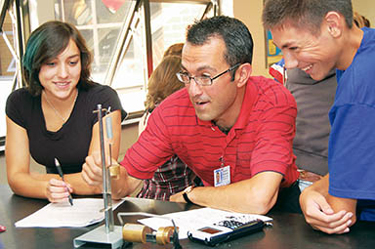

The Rewards of Teaching Science

TOP TEACHER: “People are more likely to succeed when they are surrounded by love and support,” says Richard Ognibene Jr. ’87 (MS) a Fairport, N.Y., teacher who was named New York Teacher of the Year this fall.
Richard Ognibene Jr. ’87 (MS) learned early that being a great teacher is more than knowing your subject thoroughly.
“Great teachers balance structure and love,” says the chemistry and physics teacher at Fairport, N.Y., High School. “You have to compose a great lesson plan but deliver it with love. People are more likely to succeed when they’re surrounded by love and support.”
For Ognibene, that means attending football games and concerts and sending “good news postcards” to parents when their children do particularly well.
Such dedication earned Ognibene the 2008 New York State Teacher of the Year Award, chosen this fall by a statewide committee of teachers and state administrators. He was one of five finalists—including Alison Eyre Albright ’81, an English teacher at Canandaigua, N.Y., Academy—vying for the state honor.
Ognibene, who earned his master’s degree in chemistry from the University, will represent New York in the national competition.
After earning a degree in chemistry at Sienna College, Ognibene went to Rochester to study with William Jones, the C. F. Houghton Professor of Chemistry.
“The University was a rigorous academic experience,” he says. “The excitement of working with other scientists in a chemistry lab added to my passion for teaching.”
In his high school physics lab, he moves quickly around the room as groups of students work on their assignments. He spends time with each group, asking questions, checking data and, often, making a joke.
Now into his 22nd year of teaching, Ognibene still teaches both physics and chemistry classes, and he shows no signs of slowing down or losing interest.
As he tries to impart his love of science and teaching to his students, he does so with perhaps a little bit of an agenda: He wants to start a project that will convince more math and science majors to go into teaching.
“We need to train the next generation of teachers,” he says. “Teaching can’t compete with the monetary rewards found in other fields, but there are other rewards that are equally valuable. To me, the greatest is that thousands of former students are scattered across the globe, and when I bump into them, they’re glad to see me.
“I’m thrilled when a science student writes back to me but I’m equally thrilled when a dancer writes back; when they say, ‘you made me interested in science.’ That’s the reward.”
—Joseph Sorrentino
